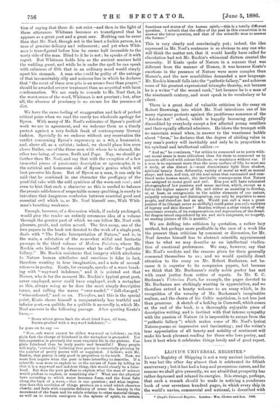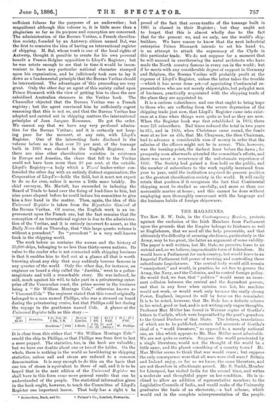LLOYD'S UNIVERSAL REGISTER.* LLOYD'S Registry of Shipping is not a
very ancient institution. It was but the other day almost that it celebrated its fiftieth anniversary ; but it has had a long and prosperous career, and for reasons we shall give presently, we are afraid that prosperity has rather depressed and relaxed its energies. It is strange, perhaps, that such a remark should be made in noticing a ponderous book of over seventeen hundred pages, in which every ship in the world's navies, commercial and national, is described with
• Lloyd's Universal Register. London: Wm. Olowes and Son. 1886.
sufficient fulness for the purposes of an underwriter ; but magnificent although this volume is, it is little more than a plagiarism so far as its purpose and conception are concerned. The administration of the Bureau Veritas, a French classifica- tion society, founded by an Antwerp citizen named Bal, was the first to conceive the idea of having an international register of shipping. M. Bal, whose tomb is one of the local sights of Antwerp, thought it possible to create for his own personal benefit a Franco-Belgian opposition to Lloyd's Register ; but he was astute enough to see that in time it would be incon- venient to have any particular national character stamped upon his organisation. and he judiciously took care to lay it down as a fundamental principle that the Bureau Veritas should be international. The advantages of this proceeding are very great. Only the other day an agent of this society called upon Prince Bismarck with the view of getting him to class the new subsidised Australian steamers in the Veritas book. The Chancellor objected that the Bureau Veritas was a French registry ; but the agent convinced him by sufficiently cogent reasoning that this is not so, and that the Bureau Veritas has adopted and carried out in shipping matters the international principles of Jean Jacques Rousseau. He got the order. We cannot say that we have any very profound admira- tion for the Bureau Veritas ; and it is certainly not keep- ing pace for the moment, at any rate, with Lloyd's Register. One of the interesting facts disclosed in the volume before us is that over 70 per cent. of the tonnage built in 1885 was classed in the English Register. As there are nine other classification societies in existence in Europe and America, the share that fel] to the Veritas eould not have been more than 20 per cent. at the outside. Lloyd's Registry—a body which a Times' leader-writer con- founded the other day with an entirely distinct organisation, the Corporation of Lloyd's—holds the field, but it must not expect to do so for ever, unless it moves a little more briskly. Its -chief surveyor, Mr. Martell, has succeeded in inducing the Board of Trade to hand over the fixing of load-lines to him, but nine years elapsed before he could induce his committee to give him a free hand in the matter. Then, again, the idea of this Universal Register is taken from the Repertoire General of the Bureau Veritas. Of course, the English work is an im- provement upon the French one, but the fact remains that the conception of an international register is due to the administra- tion of the Veritas, and it is entirely incorrect to assert, as the Daily News did on Thursday, that " this large quarto volume is without a precedent." Its " precedent " is a very well-known book in the shipping world.
The work before us contains the names and the history of 35,000 ships, belonging to no less than thirty-seven nations. Its value to the reader who is not connected with shipping business is that it enables him to find out at a glance all that is worth knowing about any ship that may suddenly become famous in any quarter of the world. Only the other day, for instance, an engineer on board a ship called the Justitia,' went to a police- magistrate and told a remarkable story. He was induced, he said, much against his will, to take part in a privateering enter- prise off the Venezuelan coast, the prime mover in the business being a " Sir William Montagu Cole," otherwise known as " Viscount Cole " The engineer stated that this vessel originally belonged to a man named Phillips, who was a steward on board during the privateering cruise, but that Phillips sold her during the voyage to the gentleman named Cole. A glance at the Universal Register tells us this story :—
210 I So. 3 m. Sr. I British 1 535 1 20'11 I 29 1 I 171 45j55 I jIISTITIA. 1 Dk. 2 B. London. 531 I P42f. F34f.
Stockton.• 11462 15 Bbds. I sg,PZ,F.5;607pd..1. I W. Phillips.
It is clear from this either that " Sir William Montagu Cole" resold the ship to Phillips, or that Phillips was from first to last a mere puppet. The statistics, too, in the book are valuable ; but we have our doubts about one or two of the tables. On the whole, there is nothing in the world so bewildering as shipping statistics, unless sail and steam are reduced to a common denomination. It is easy enough to do this on the basis that one ton of steam is equivalent to three of sail, and it is to be hoped that in the next edition of the Universal Register we shall have in this form some more general results that can be understanded of the people. The statistical information given in the book ought, however, to teach the Committee of Lloyd's Register one important lesson. That body has a right t' be
Richardson, Duck, and Co. 1- Palmer's Co., Limited, Newcastle.
proud of the fact that seven-tenths of the tonnage built in 1885 is classed in their Register ; but they ought not to forget that this is almost wholly due to the fact that for the present we, and we only, are the world's ship- builders. We have reason to know that the next industrial enterprise Prince Bismarck intends to set his hand to, is an attempt to attack the supremacy of the Clyde in this particular trade. We do not suppose for a moment that he will succeed in overthrowing the naval architects who have made the North country famous in every sea in the world ; but if he meets with any considerable degree of support in Germany and Belgium, the Bureau Veritas will probably profit at the expense of Lloyd's Register, unless the latter takes the trouble —which it has never done yet—of appointing Continental re- presentatives who are not merely shipwrights, but polyglot men of business, practically acquainted with the shipping trade of the place they are appointed to.
It is a curious coincidence, and one that ought to bring hope to those who are suffering from the severe depression of the shipping trade just now, that Lloyd's Register came into exist- ence at a time when things were quite as bad as they are now. When the Register book was first established in 1834, there were 721 subscribers. Bad times reduced the total in two years to 615, and in 1836, when Christmas came round, the funds were at so low an ebb, that Mr. Chapman, the then Chairman, had to advance a considerable sum of money in order that the salaries of the officers might not be in a rrear. This, however, was the turning-point, the darkest hour before the dawn ; for prosperity soon afterwards attended the committee's efforts, and there was never a recurrence of the unfortunate experience of 1836. The Society had gained a firm hold on the public, and the number of subscribers to the work rapidly increased from year to year, until the institution acquired its present position as the greatest classification society in the world. It will easily retain that position if it recognises the fact that Continental shipping must be studied as carefully, and more so than our mercantile marine at home ; and this cannot be done without employing men thoroughly conversant with the language and the business habits of foreign shipowners.



































 Previous page
Previous page